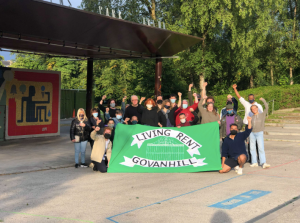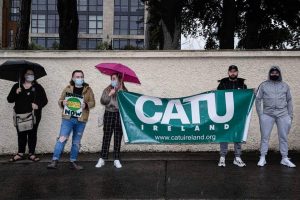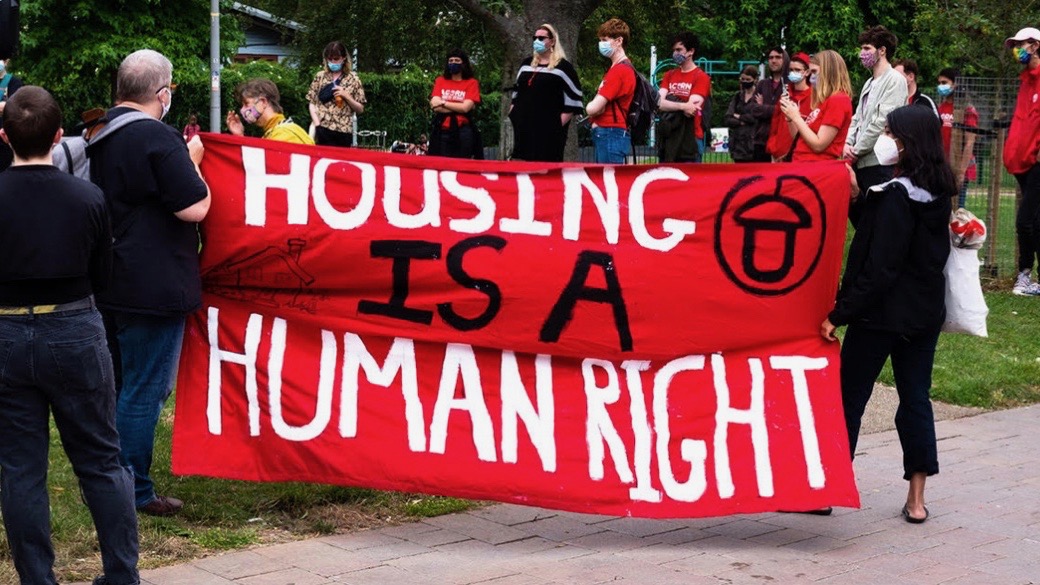The COVID-19 pandemic and the socio-economic crisis worsened by it has affected people from all walks of lives across the world, with the working class being forced to bear the burden of the ongoing crisis. In most parts of the world, the common peoples’ tax money has been used by governments to save big businesses, while small-scale enterprises and the livelihoods of millions of people have been ruined in this period due to lockdowns and other rotating restrictions to contain the pandemic.
Many sections of society have adapted to this ‘new normalcy’ and slowly started reconfiguring their lives, especially as developed countries in Europe and North America – boasting higher vaccination rates – have fully or partially lifted lockdowns and other regulations which were imposed to contain the spread of COVID-19. However, the lives of refugees and poor people still remain miserable as there has been no break on imperialist aggression and capitalist profiteering even during the pandemic. Working class sections and lower middle class families have been facing an acute housing crisis, marked by skyrocketing property prices, higher rents, space crunch, soaring rent debts, and threats of evictions. Political groups have dared to mount resistance to such challenges by organizing grassroots community organizations and intensifying campaigns for housing rights.
Scotland

‘Ban on evictions’ and ‘control over rents’ have become the watchwords of Scottish tenants rights group Living Rent in these days marred by the raging pandemic. Living Rent committees across various cities in Scotland, especially the Glasgow committee, have resisted numerous attempts by landlords to forcefully evict tenants during last winter through legal and militant community actions.
Groups that have been relentlessly trying to safeguard tenants rights welcomed the power sharing agreement brokered between the Scottish Nationalist Party (SNP) and the Greens on August 20, which included promises for a national system of rent controls, more protection from eviction, a ban on winter evictions, additional rights and better regulation and enforcement.
Regarding the assurances made in the agreement for tenants rights, Living Rent said, “these are things Living Rent members have been demanding for years – and the pandemic has only shown just how urgent these changes are. This is a massive win for all of us. If done right, these measures will be utterly transformative. There is no doubt it wouldn’t have happened without us, and it is clear evidence that when tenants organize and fight, there is nothing we can’t win.”
However, the group is also cautious that their work is not over. It said, “the devil will be in the detail, and we already know that landlords will be working tirelessly to water this down.”
Germany

The coalition ‘Living for everyone! Together against high rents and displacement’, which comprises of housing rights groups like #Mietenwahnsinn, Rentstopp, and Expropriate Deutsche Wohnen & Co., organized a demonstration on September 11 demanding radical changes in the rent and housing policy in Germany. The coalition stated that “despite often stagnating wages and income losses during the COVID-19, rents continue to rise, homelessness is increasing and many people have to pay an increasing percentage of their income for excessive rents.”
“Housing is a human right, not a commodity!” the coalition asserted.
On September 26, in a referendum on housing policy conducted along with the State and federal polls in Berlin, 56.4% Berliners opted for state expropriation of large real estate companies like Deutsche Wohnen and Vonovia (against 39%) to end speculative real estate and rent madness in the city.
Various groups like Expropriate Deutsche Wohnen & Co. have been campaigning for a referendum in Berlin to demand the government appropriation of 240,000 apartments from big property dealers like Deutsche Wohnen, Vonovia, Akelius & Co., and others.
Following the declaration of the results of the referendum, Expropriate Deutsche Wohnen & Co campaign stated, “if not many of the people who are particularly suffering from rent madness were excluded from the referendum because of lack of right to vote, then the result would have been even more clear. Now Berlin politicians are obliged to implement the will of the people.”
Berliners have been facing an acute housing crisis and tenant rights groups have been campaigning to regulate rents and control the burgeoning real estate mafia. Taking note of such demands, the State government in Berlin led by the Social Democrat-Die Linke-Green coalition (Red-Red-Green alliance) adopted a bill on January 30, 2020, calling for freezing house rents in the city at current rates till 2025.
However, on April 15 this year, Germany’s Constitutional Court scrapped the law saying that the Berlin State government could not impose its own law in the German capital while the federal government in the country has its regulations to control the rents. The judgement was favorable to housing and realtor associations and their lackeys in the Christian Democratic Union of Germany (CDU) and Free Democratic Party (FDP). Such a judgment by the Constitutional Court outraged tenant rights groups who organized massive protests in Berlin.
Ireland

For the past few years, cities in the Republic of Ireland, especially capital Dublin, have been witnessing frequent protests by ‘Raise the Roof’ campaign, demanding government action to solve the soaring housing crisis in the country. However, neither the previous Fine Gael-led government, nor the incumbent Fianna Fail, Fine Gael, and Green Party-led coalition have implemented any real pro-people policies to resolve the acute housing crisis faced by city dwellers across the Irish Republic. Activists and committees of tenants rights groups like the Community Action Tenants Union (CATU) have been organizing significant resistance to forced evictions.
On September 15, housing rights groups and other progressive sections in Ireland demonstrated outside Leinster House, the Irish parliament building, and Dublin city center, demanding genuine and concrete action from the government to address the housing crisis. The gatherings were attended by political parties and groups including the Communist Party of Ireland (CPI) and Connolly Youth Movement (CYM), as well as MPs from Sinn Fein, Social Democrats, and People Before Profit, among others.
On August 10, citing figures from the Residential Tenancies Board (RTB), Gabija Gataveckaite and Charlie Weston wrote in the Independent.ie that almost 500 notices of termination of rent agreements were issued by landlords in Ireland between April and June alone, intending to sell their properties to cash in on the ongoing property price boom. According to their report, rental costs have also shot up again despite efforts by the government to ease the rate of increase.
There have also been reports that developers have charged EUR 554,842 (USD 652,244.51) for three-bedroom apartments, EUR 427,887 (USD 503,002.56) for two-bedroom apartments, and EUR 282,323 (USD 331,884.80) for one-bedroom apartments in a 1,221 unit apartment scheme planned for Baldoyle in North Dublin.
Researchers claim that the Irish state has historically favored ‘home ownership’ rather than any state-led investment in public housing. In July 2021, the government passed the Affordable Housing Bill 2021. It calls for a cost rental model in which the residents have to cover the cost of constructing the accommodation in the form of a long-term building loan. However, working class sections in the country insist that there should be universal public housing financed by progressive rents linked to income while the private sector and landlords and developers must be removed from housing provision.
In his article in Socialist Voice, Jimmy Doran from the Trade Union Left Forum accused that “the Irish government’s housing policy is working perfectly well for landlords, builders, speculators, and developers; that is who it is designed to benefit.”
Serbia

Družena Akcija Krov nad Glavom (Joint Action For Roof Over Your Head) is a housing rights action group in Serbia which has been at the forefront of defending tenants rights and providing relief to homeless people in the country during the COVID-19 lockdown period. These days, the action group has been busy resisting a series of legally questionable evictions from neighborhoods in Belgrade. On August 22, along with the Association of Fine Artists of Serbia (ULUS), the group protested the forced eviction of 80-year-old Dragana Milisavljević, a retired professor and artist, from her apartment in Cvijićeva 79. The group also protested the bid to evict Milica Baklaic, the mother of a Serbian fighter who died in 1993, from their apartment at Milana Tankosica Street in Belgrade on August 26.
Regarding the protests, Družena Akcija Krov nad Glavom stated, “If we do not oppose and break the spiral of injustice, it will never stop on its own. The “winners” of the transition will grab more and more, and the unfortunate people will more and more perish and end up on the street.”
Read also: Luxembourg’s housing policy has widened inequality
United Kingdom

Meanwhile, in the UK, the activities of tenants rights group ACORN have has a substantial impact. On August 23, Tribune magazine published an article on the exemplary activities carried out by the ACORN branch in Oxford. ACORN Oxford’s campaign to stop discrimination against benefit recipients had a tremendous impact on the livelihoods of people in Oxford, “the city with the highest proportion of renters in England, coupled with the highest rents.”
Many of the landlords and their agents in Oxford would pursue a policy of discrimination by refusing to rent to people in receipt of Universal Credit or other housing benefits, citing ‘fluctuations’ in the Universal Credit that tenant receives. Universal Credit is a social security payment in the UK distributed to working-age people with a low household income.
By end of April this year, ACORN Oxford started a campaign to end discrimination against renters on benefits in the city, which has become popular as the ‘Say Yes to DSS’ (benefits from the Department of Social Security) campaign. By the last week of July, the Say Yes to DSS campaign became a massive people’s movement in the city, joined by trade unions, social movements and progressive political parties. Such a popular campaign by the city dwellers culminated in a historic success when the Oxford city council unanimously agreed to put an end to “DSS discrimination” against tenants in receipt of housing benefits and Universal Credit on July 26.
Other parts of Europe

In the first week of September, students and youth groups in the Dutch city of Groningnen protested the acute housing crisis faced by the students there, and occupied a building of the University of Groningen demanding the university and municipal authorities to resolve the issue. On September 12, progressive sections in Amsterdam organized a massive ‘Het Woonprotest’ against the housing crisis in the city. Their demands included rent caps, control over speculative real estate business, and implementation of an inclusive housing policy.
In Belgium, the Workers Party of Belgium (PTB/PVDA) has called on the authorities to appropriate unused private and public housing facilities across cities in Wallonia to rehabilitate people affected by flash floods and heavy rains in the region in July this year.
Hungarian housing rights group A Város MindenkiéIn (The City is for Everyone) and Portuguese housing rights group Stop Evictions have also made significant efforts to defend housing rights during the pandemic period. In Luxembourg, housing rights groups such as Mieterschutz and Save CoHousing in Esch, along with the Independent Luxembourg Trade Union Confederation (OGBL), Dei Lenk (The Left) and the Communist Party of Luxembourg (KPL), organized multiple campaigns and protests demanding dignified and affordable housing. In Italy, the Tenants and Inhabitants Association (ASIA-USB) joined the call for a general strike on October 11 given by grass root social movements and trade unions, including Si Cobas and USB, against precarious jobs, lay offs, exploitation, evictions, gender discrimination, and the organizing of the G-20 summit in Rome.
These stories of militant campaigns, organized resistance and other dynamic actions by tenants rights groups and community organizations have imparted a new spirit and resolve among grassroots organizations of the working class across Europe. But, the fight is far from over as hundreds of thousands of people in third world countries are becoming refugees due to ongoing imperialist aggression. It is impossible for any organization in the world to provide a roof, food, and jobs for all the people uprooted from their native lands. Many of these refugees venture out to reach Europe and the US through perilous paths, seeking a better life. Thousands among them either die en route or rot in jail. Migrants from North Africa and Asia constitute a key section of the workforce in Europe, as does the Latinx community in the US. To secure a ‘future’ for such working class groups, progressive political sections have to support the militant struggles of community organizations and link it with larger struggles against imperialism and crony capitalism.
The title of the article is adapted from the poem The Ballad Of The Landlord written by Langston Hughes





